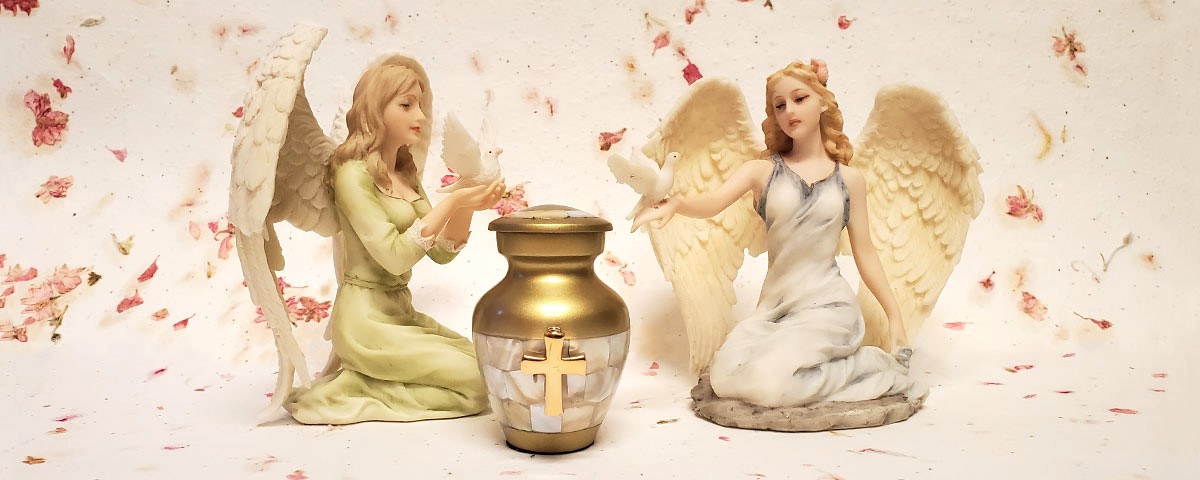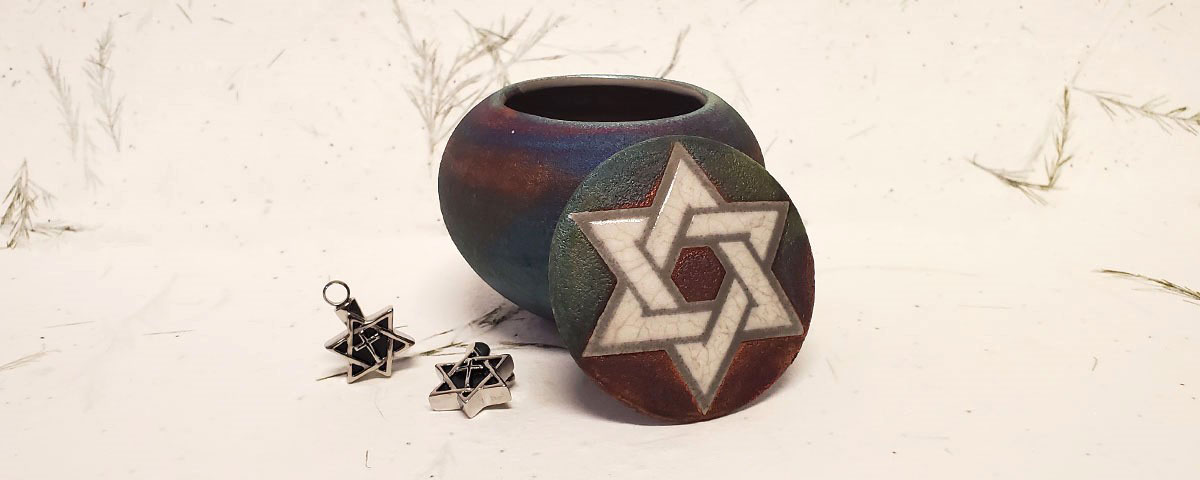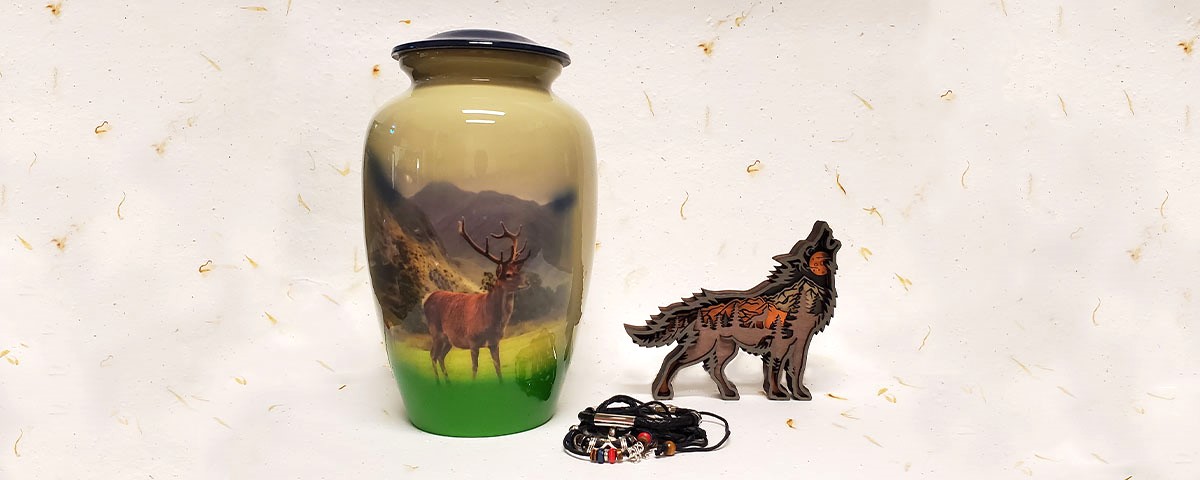When you look at it through the lens of religion, cremation can be a contentious topic. In some religions, such as Buddhism and Hinduism, cremation is the most common practice. In other religions, such as the Eastern Orthodox Church or Islam, cremation is considered a forbidden practice. Many religious sects fall somewhere in between these two extremes. Some religions allow families to choose the option that works best for them, while others set strict limits on the types of rites people can have before or after cremation.
Do you wonder how other religions approach cremation as a practice? Do you want to know how your beliefs line up with others? With this information, you’ll have a general understanding of each religion’s views on cremation.
Christianity and Cremation
Christians may not prefer to choose cremation, but many sects will accommodate people who want to be cremated. Cremation is an established practice in the Bible, even if it is not listed as an ideal option. In the Old Testament, per Christianity.com, references in Amos, Leviticus, and 1 Samuel note that cremation was practiced under certain circumstances. Since many of these instances reflect burning as punishment, some Christian scholars cite these scriptures as evidence that cremation should not be the default choice.
In the New Testament, Paul’s first letter to the Corinthians gives proponents of cremation a few scriptures to use as advocacy. He notes that people can give up their bodies to be burned. In a later part of the scripture, he says that God can resurrect any body in any condition. As such, people who were cremated would not be denied access to the resurrection, a major tenet of Christian belief.


Roman Catholic Church
The Roman Catholic Church has never treated cremation as an ideal choice, but the church allows people who choose cremation to have a proper Roman Catholic burial. By the 1960s, changing attitudes about cremation led the church to update previous arguments against cremation. A 1963 announcement from the Vatican allowed services for people who were cremated, according to CNN.
By 2016, cremation becoming the standard in places like the U.S. and Canada led the Vatican to issue updated guidance. Cremation is an acceptable choice for Roman Catholics, as long as faithful members of the church follow it with a burial in a cemetery. This guidance was designed to clarify the church’s position on cremation, but also to say that other methods like scattering are not acceptable.
Eastern Orthodox Church
Although many Christian sects have expanded views to accommodate cremation, the Eastern Orthodox Church does not permit it. This church takes a traditional perspective, citing Byzantine Canon Law and its original ban on cremation. According to Orthodox Church in America, the church does not see cremation as a fitting or considerate means of handling the remains of people. With little change over time, the church does not expressly allow cremation, much less encourage it.
In some cases, people who will be cremated may receive Eastern Orthodox funeral services. These services could happen prior to the cremation, but not afterward. As a general rule, members should not expect their churches to offer such a practice. It may happen due to extenuating circumstances, but it would depend on the person, the circumstance, and the religious official providing the service.
Protestant Tradition
Not unlike the Roman Catholic and Eastern Orthodox churches, Protestant Christian sects historically forbid cremation because they believed it would deny people who were cremated access to the resurrection. In the modern day, however, most Protestant sects take a practical view of cremation.
Many Protestant funeral practices are designed to comfort the grieving instead of preparing the deceased person for entry into the next life, according to the Musée Protestant. As such, cremation doesn’t pose the same kind of quandary for Protestants as it might for a traditional Roman Catholic or Eastern Orthodox member. Choosing cremation because it is more practical and cheaper comes easier for Protestants, who generally do not believe that they need a specific treatment of the body after death to enter into heaven.
The Church of Jesus Christ of Latter-Day Saints (Mormonism)
Although the Church of Jesus Christ of Latter-Day Saints does not forbid cremation, it generally encourages a traditional burial. Like many Protestant sects, The LDS Church leaves the decision up to individual families. Citing the book of Alma in the Book of Mormon, the LDS Church’s holy scripture, LDS Living magazine notes that they also believe that cremation is not a barrier to resurrection. The magazine reports that a president of the church wrote in 1972 that traditional burial was best. By the 1990s, however, with burial plots waning and costs rising, the church updated its position to say that cremation was acceptable as well.
Jehovah’s Witnesses
Similar to other Protestant sects, Jehovah’s Witnesses do not see any particular problem with cremation. According to JW.org, the official site for the church, cremation does not create any obstacle for resurrection. They note that funeral arrangements should be respectful, but argue that the Bible does not make any official guidance about handling dead bodies beyond that. The church makes a note of following local practices, whatever they are, but also gives families freedom to choose to do something different.
Christian Urns and Jewelry
Since millions of Christians have the ability to choose cremation if it suits them and their loved ones, finding the right way to hold the remains for burial or scattering has become an important part of the grieving process. In The Light Urns offers a wide selection of Christian-themed urns, including angels, crosses, praying hands, and more. We also offer rosary necklace urns, for those who want to keep their loved ones close.
Judaism and Cremation
Jewish law approaches the practice of cremation in a variety of ways. Most rabbis and Jewish scholars discourage the practice of cremation. That said, many of them do not forbid it or refuse to provide services for a Jewish person who was cremated. People of the Reform and Reconstructionist movements may be more likely to look at cremation as an acceptable choice, reflecting changing opinions on cremation in many countries.
From a theological standpoint, scholars use multiple verses in the Torah to argue in favor of a prompt burial, against cremation. Devarim 21:21, published by Chabad.org, indicates that even a man who is sentenced to death ought to be buried the same day. In Vayikra 20:14, according to Chabad.org, burning to death is a punishment for certain kinds of sexual acts outside of marriage. This example, among several, set up cremation as a unique and terrible fate set aside for those who have trespassed outside the law.
Changing Outlooks
At present, the Jewish community tries to balance the push toward cremation as a common option, sometimes at odds with tradition and law. In the U.S. in particular, the cost of a traditional burial often means that people choose cremation even when they wouldn’t otherwise. The need to provide an adequate rest for a family’s loved one leads to difficult decisions.
Of course, many Jewish people feel no conflict in choosing cremation for themselves or their loved ones, looking for Jewish urns and other ways to provide an honorable rest. The general consensus among Jewish sects is that rabbis may choose to perform services before or after cremation, but they should try to help people choose a traditional burial first.


Islam and Cremation
As a general rule, Muslims avoid cremation. For Muslims, cremation represents a corruption of the body after death. Specifically, Islamic scholars cite Qur’an 80:21 as evidence that the Creator called for burial of a human body in a grave. In this case, cremation acts as a violation of the body in a way that people would consider grievous to a person who is alive.
Haram Practices
lslamic law classifies certain actions as halal or haram. Halal indicates practices that are acceptable or required by law. Haram depicts actions that are forbidden or considered in violation of the law. Cremation falls under haram, meaning an unclean practice that faithful Muslims should avoid.
For more recent guidance, Fatwa 84867 asserts that cremation cannot be anything but haram. A fatwa is a legal opinion concerning Islam, which isn’t necessarily binding but comes from an expert in Islamic law. In this fatwa, published in 2002, the act of cremation is compared to “breaking a dead’s bones … as if he is alive."
Mandatory Cremation During COVID-19
In late 2020, Al Jazeera reported outrage from Sri Lanka’s minority Muslim community over the mandatory cremation of people who had died with an active COVID-19 infection. Citing the example of a 20-day-old newborn who had been cremated despite his parents’ express wishes that he be buried according to Islamic law, Al Jazeera noted several protests against this practice. Muslims in Sri Lanka argued that burial was no more risky for the spread of COVID-19 than cremation, and said they would refuse to pay the fees for the cremation.
Secular, Agnostic, or Atheist Views on Cremation
For the most part, people who do not have particular religious beliefs may be more likely to choose cremation than not. The Cremation Association of North America notes that people with no religious affiliation, as well as those with affiliations to non-Christian religions, were more likely to opt for cremation instead of a traditional burial.
Funeral rites among people with no religious affiliation may depend more on local customs than religious traditions. Some people might choose a traditional burial with a graveside service, while others may want a memorial service followed by a scattering of ashes on water.


Hinduism and Cremation
For Hinduism, cremation is enshrined as a proper practice for the handling of the dead. In the Antyesti, which refers to Hindu funeral rites, cremation is a common practice for nearly everyone. Certain people may not be cremated according to Hindu funeral rites, infants in particular.
The ancient premise for cremation comes from the Rig Veda, a collection of ancient Vedic hymns. In Hymn 16 of the 10th book of the Rig Veda, the hymn depicts burning of a body to release the spirit. Typically, families should cremate the body within 24 hours of death, with the ashes scattered on water a day or two after the cremation is complete.
Modern Cremation Practices
Although cremation is a modern, common practice for most people in the United States and Canada, the Hindu practice still retains much of the old traditions. Open-air cremation may not be a requirement of the Antyesti, but many people still choose this option when it is possible. The academic journal NTM cites this practice in particular–burning bodies in open air instead of using crematoria–as a way Indians chose to rebuff Western influence.
Buddhism and Cremation
Buddhism also sees cremation as a fundamental part of funeral rites. Buddha himself was cremated, and many Buddhist practices came from a collection of his teachings written and organized after his death. This collection is known as Tipitaka or Tripitaka, meaning three baskets, and it includes detailed funeral rites.
The practice of cremation depends on the region, the sect, and the person. For example, Tricycle: The Buddhist Review notes that Theravada Buddhists cremate most people after a long vigil at home and a religious procession to the funeral site. By comparison, Tibetan Buddhists reserve cremation for incarnate lamas, although they may cremate other people during the winter months. Tibetan Buddhists prefer sky burials for most people, which is a process of dismemberment and feeding to birds of prey.
Japan and Cremation
Japan has some of the highest rates of cremation in the world–nearly 100 percent. Buddhism plays a heavy role in this choice, although it was not without controversy, according to JSTOR Daily. With the spread of Buddhism into Japan in the 700s, cremation began to increase in popularity. By the 1200s, cremation became a common practice for all people, not just aristocrats and priests.
Despite a brief banning of cremation in the 1870s, due to Confucians’ opposition to the practice, cremation continued as part of Japanese culture. Ultimately, space became the biggest deciding factor. Practicing cremation according to Buddhist funeral traditions had allowed families to keep the remains of their ancestors in much smaller spaces. Burial remains an impractical choice for a highly-populated island nation.
Taoism and Cremation
Taoism allows cremation or burial. Historically, Taoism taught that the body was an important vessel for the soul, during and after death. Various texts, including Chapter 33 of the Tao Te Ching, assert that people stay with themselves as a kind of eternal presence. Cremation sometimes comes into conflict with this belief. Nonetheless, many instances of cremation throughout history indicate that Taoists practiced cremation for positive reasons, not just as a way of retaliating against enemies or minimizing the spread of disease.
Christina Hee-Yeon Han, an historian and curator at Wilfrid Laurier University, notes that cremation began in China as early as the Neolithic period. She argues that cremation did not become commonplace until the Five Dynasties period in the 900s. Han cites the cremation of Queen Mother Li in 950 as an example of Buddhist confluence with Taoist traditions, making cremation more mainstream and accepted as a choice.
Sikhism and Cremation
Sikhs look at the body as a temporary house of the soul, which makes cremation of the body an acceptable and even preferred practice. Sikhism calls for a quiet celebration of the person, followed by a disposition of their remains in a variety of possible ways. The Sikh scripture, Sri Guru Granth Sahib, notes various ways that families can handle the bodies of the dead. Cremation is listed as the first. As such, many Sikhs opt for cremation as the best method of attending to their loved ones, but they may also choose burial.
Cremation is the last step of Antam Sanskar, the Sikh funeral rites. During these rites, families go to a service at home or a gurdwara, a Sikh place of worship. They recite prayers to comfort the family, and give speeches about the person who died. If possible, a close family member starts the cremation process. Once the body has been cremated, families often choose to put the ashes in the closest river. As a general rule, Sikhs do not bury bodies or erect headstones.
Making a Decision About Cremation
For many families, choosing cremation is a matter of practicality. For millions of people worldwide, cremation represents a time-honored religious tradition. For millions of others, cremation represents a fundamental disrespect for the dead. The thing that matters is what you believe, for yourself and your loved ones.
Traditional rites and sacred texts shape these views, even if certain religions have changed their perspectives and rules over time. By understanding these perspectives, you can determine whether cremation is the right choice for you or your loved ones.
Key Takeaway:
Religions hold varied positions on whether to accept cremation over traditional burial. Christianity and Judaism prefer traditional burial, but now accept cremation due to its increase in popularity worldwide. Islam still forbids cremation. Hinduism, Sikhism, and Buddhism all prefer cremation to traditional burial.
MEET THE FOUNDER
Susan Fraser
Susan Fraser, founder of In the Light Urns, Inc., has spearheaded innovation in the memorial industry since 2001. After a personal tragedy, she began creating custom cremation urns for ashes that reflect a lost loved one's individuality. Susan's commitment to comfort makes her an authority on cremation and memorials, guiding and consoling families through understanding and compassion. With expertise and dedication, Susan's cremation guides give families invaluable resources for informed decisions.


Cremation Education
Cremation education informs diverse practices and ethics, empowering informed end-of-life choices.







